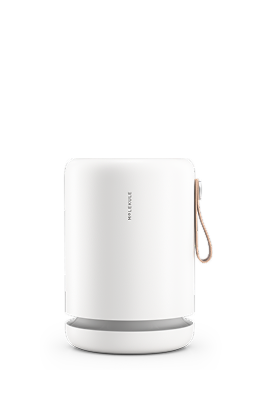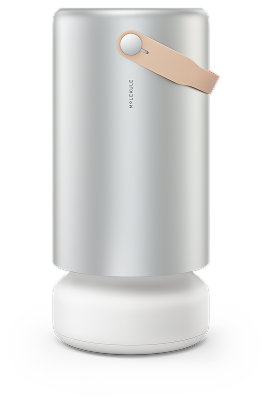White Papers, Technology Reports & Patents
Molekule believes in scientific disclosure. That’s why we make our testing and scientific data public.
US Patent granted for Fluorine-Free Firefighting Foams
US Patent granted for Fluorine-Free Firefighting Foams
Patent granted by the United State Patent and Tardemark Office | covers Molekule’s proprietary Fluorine-Free Firefighting Foams for advanced fire extinguishing system.
Patent granted by the United State Patent and Tardemark Office | covers Molekule’s proprietary Fluorine-Free Firefighting Foams for advanced fire extinguishing system.
US Patent granted for Photocatalytic Air Purification Technology
US Patent granted for Photocatalytic Air Purification Technology
Patent granted by the United States Patent and Trademark Office | Covers Molekule’s proprietary photocatalytic fluid filtration system for advanced contaminant removal using UV-activated media
Patent granted by the United States Patent and Trademark Office | Covers Molekule’s proprietary photocatalytic fluid filtration system for advanced contaminant removal using UV-activated media
HEPA versus PECO on removing cat dander allergy triggers in a murine model
HEPA versus PECO on removing cat dander allergy triggers in a murine model
Testing done by Florida International University | Peer-reviewed in Nature's Scientific Reports, an open-source journal of natural sciences, psychology, medicine and engineering
Testing done by Florida International University | Peer-reviewed in Nature's Scientific Reports, an open-source journal of natural sciences, psychology, medicine and engineering
Results from a 6-week small chamber study demonstrated that breathing air cleaned by a PECO filter led to better control of cat dander allergies compared to air cleaned by a HEPA filter.
Florida International University is an independent laboratory and this experiment was supported by Molekule Group, Inc.
Results from a 6-week small chamber study demonstrated that breathing air cleaned by a PECO filter led to better control of cat dander allergies compared to air cleaned by a HEPA filter.
Florida International University is an independent laboratory and this experiment was supported by Molekule Group, Inc.
Inactivation of Coronavirus Strains & H1N1 Flu Virus by Air Mini
Inactivation of Coronavirus Strains & H1N1 Flu Virus by Air Mini
Testing done by University of Minnesota College of Science and Engineering and College of Veterinary Medicine | Peer-reviewed in Indoor Air, the International Journal of Indoor Environment and Health
Testing done by University of Minnesota College of Science and Engineering and College of Veterinary Medicine | Peer-reviewed in Indoor Air, the International Journal of Indoor Environment and Health
Results demonstrated that Molekule Air Mini was able to significantly inactivate concentrations of bovine and porcine coronavirus, as well as H1N1 influenza, following a single-pass wind tunnel test of the aerosolized viruses.
University of Minnesota is an independent, third-party testing laboratory. Molekule air purifiers have not yet been tested on COVID-19.
Results demonstrated that Molekule Air Mini was able to significantly inactivate concentrations of bovine and porcine coronavirus, as well as H1N1 influenza, following a single-pass wind tunnel test of the aerosolized viruses.
University of Minnesota is an independent, third-party testing laboratory. Molekule air purifiers have not yet been tested on COVID-19.
Virus Destruction Efficiency of Air Pro RX PECO-Filters
Virus Destruction Efficiency of Air Pro RX PECO-Filters
Testing done by Aerosol Research and Engineering Labs (ARE)
Testing done by Aerosol Research and Engineering Labs (ARE)
Results demonstrated that Air Pro RX PECO-Filters lead to a significant degree of destruction of MS2 Bacteriophage.
ARE is an independent, third-party testing laboratory. Test was conducted on a PECO-Filter in a testing environment.
Results demonstrated that Air Pro RX PECO-Filters lead to a significant degree of destruction of MS2 Bacteriophage.
ARE is an independent, third-party testing laboratory. Test was conducted on a PECO-Filter in a testing environment.
Efficacy of Air Mini Against MS2 Bacteriophage Virus and Particulates
Efficacy of Air Mini Against MS2 Bacteriophage Virus and Particulates
Testing done by Aerosol Research and Engineering Labs (ARE)
Testing done by Aerosol Research and Engineering Labs (ARE)
Results demonstrated that Molekule’s PECO technology was able to significantly reduce concentrations of MS2 bacteriophage virus, following a single injection of the aerosolized virus into a chamber.
ARE is an independent, third-party testing laboratory.
Results demonstrated that Molekule’s PECO technology was able to significantly reduce concentrations of MS2 bacteriophage virus, following a single injection of the aerosolized virus into a chamber.
ARE is an independent, third-party testing laboratory.
Airborne Virus Destruction of PhiX174 by Air Mini Device
Airborne Virus Destruction of PhiX174 by Air Mini Device
Testing done by Intertek
Testing done by Intertek
Results demonstrate that Molekule’s PECO technology was able to significantly reduce concentrations of virus PhiX174 following a single injection of the aerosolized virus into a chamber.
Intertek is an independent, third-party, nationally recognized testing laboratory.
Results demonstrate that Molekule’s PECO technology was able to significantly reduce concentrations of virus PhiX174 following a single injection of the aerosolized virus into a chamber.
Intertek is an independent, third-party, nationally recognized testing laboratory.
Evaluation of short-term initial performance of a Molekule Air portable air cleaner
Evaluation of short-term initial performance of a Molekule Air portable air cleaner
Testing done by Lawrence Berkeley National Laboratory
Testing done by Lawrence Berkeley National Laboratory
Experiment by a National Laboratory on Molekule Air over days of continuous operation. Molekule Air was challenged in a controlled environment on concentrations of pollutants typically encountered indoors. Performance on volatile organic compounds (VOCs) and ozone was investigated in addition to assessment for possible formation of byproducts.
Lawrence Berkeley National Laboratory is an independent, third-party, national laboratory.
Experiment by a National Laboratory on Molekule Air over days of continuous operation. Molekule Air was challenged in a controlled environment on concentrations of pollutants typically encountered indoors. Performance on volatile organic compounds (VOCs) and ozone was investigated in addition to assessment for possible formation of byproducts.
Lawrence Berkeley National Laboratory is an independent, third-party, national laboratory.
Particulate Matter Capture Test Reports
Particulate Matter Capture Test Reports
Testing done by Intertek
Testing done by Intertek
Testing shows Molekule Air and Molekule Air Mini reduce concentrations of particulate matter after a short time in a sealed chamber.
Intertek is an independent, third-party, nationally recognized testing laboratory.
Testing shows Molekule Air and Molekule Air Mini reduce concentrations of particulate matter after a short time in a sealed chamber.
Intertek is an independent, third-party, nationally recognized testing laboratory.
VOC Mixture Reduction Test Reports
VOC Mixture Reduction Test Reports
Testing done by Intertek
Testing done by Intertek
Testing shows Molekule Air and Molekule Air Mini reduce concentrations of formaldehyde, toluene, and D-limonene after a short time in a sealed chamber.
Intertek is an independent, third-party, nationally recognized testing laboratory.
Testing shows Molekule Air and Molekule Air Mini reduce concentrations of formaldehyde, toluene, and D-limonene after a short time in a sealed chamber.
Intertek is an independent, third-party, nationally recognized testing laboratory.
Bacteria, Mold, and Virus Destruction Test Reports
Bacteria, Mold, and Virus Destruction Test Reports
Testing done by Aerosol Research and Engineering Labs (ARE)
Testing done by Aerosol Research and Engineering Labs (ARE)
Testing reveals Molekule’s PECO Technology successfully destroys mold, bacteria and viruses.
ARE is an independent, third-party testing laboratory.
Testing reveals Molekule’s PECO Technology successfully destroys mold, bacteria and viruses.
ARE is an independent, third-party testing laboratory.
PECO Technology White Paper
PECO Technology White Paper
Testing done by University of Minnesota Particle Calibration Laboratory, University of South Florida Clean Energy Research Center & University of Florida Disinfection and Sterilization Laboratory
Testing done by University of Minnesota Particle Calibration Laboratory, University of South Florida Clean Energy Research Center & University of Florida Disinfection and Sterilization Laboratory
PECO, Photo Electrochemical Oxidation, is a patented air purification process that breaks down pollutants at a molecular level. Over years of research and development, many reports and studies have been published on the technology by third party testing laboratories. This white paper provides an overview of the results of this testing.
Test was conducted on a PECO-Filter in a testing environment. Author Dr. Yogi Goswami is a distinguished professor at University of South Florida and Molekule Chief Scientist. Author Dilip Goswami is President and CTO of Molekule.
PECO, Photo Electrochemical Oxidation, is a patented air purification process that breaks down pollutants at a molecular level. Over years of research and development, many reports and studies have been published on the technology by third party testing laboratories. This white paper provides an overview of the results of this testing.
Test was conducted on a PECO-Filter in a testing environment. Author Dr. Yogi Goswami is a distinguished professor at University of South Florida and Molekule Chief Scientist. Author Dilip Goswami is President and CTO of Molekule.
VOC Toluene Destruction Test Report
VOC Toluene Destruction Test Report
Testing done by University of Minnesota Particle Calibration Laboratory
Testing done by University of Minnesota Particle Calibration Laboratory
Testing shows PECO technology outperforms carbon filters and reduces VOCs to undetectable levels in 90 minutes.
Test was conducted on a PECO-Filter in a testing environment. University of Minnesota is an independent, third-party testing laboratory. Testing conducted at University of South Florida Clean Energy Research Center, where Molekule Chief Scientist Dr. Yogi Goswami is a distinguished professor. Dr. Goswami did not participate in this study.
Testing shows PECO technology outperforms carbon filters and reduces VOCs to undetectable levels in 90 minutes.
Test was conducted on a PECO-Filter in a testing environment. University of Minnesota is an independent, third-party testing laboratory. Testing conducted at University of South Florida Clean Energy Research Center, where Molekule Chief Scientist Dr. Yogi Goswami is a distinguished professor. Dr. Goswami did not participate in this study.
Ozone Emission Test Report
Ozone Emission Test Report
Testing done by Intertek and University of Minnesota Particle Calibration Laboratory
Testing done by Intertek and University of Minnesota Particle Calibration Laboratory
Testing shows PECO technology doesn’t produce ozone as a byproduct and actually reduces it in the air.
Intertek is an independent, third-party, nationally recognized testing laboratory. Testing conducted at University of South Florida Clean Energy Research Center, where Molekule Chief Scientist Dr. Yogi Goswami is a distinguished professor. Dr. Goswami did not participate in this study.
Testing shows PECO technology doesn’t produce ozone as a byproduct and actually reduces it in the air.
Intertek is an independent, third-party, nationally recognized testing laboratory. Testing conducted at University of South Florida Clean Energy Research Center, where Molekule Chief Scientist Dr. Yogi Goswami is a distinguished professor. Dr. Goswami did not participate in this study.
The Effect of PECO on Nasal and Ocular Allergy Symptoms
The Effect of PECO on Nasal and Ocular Allergy Symptoms
Published in the Journal of Allergy and Rhinology in 2018.
Author Jennifer Wong is an employee at Molekule. Author Dr. Nikhil Rao is a medical advisor to Molekule.
Published in the Journal of Allergy and Rhinology in 2018.
Author Jennifer Wong is an employee at Molekule. Author Dr. Nikhil Rao is a medical advisor to Molekule.
Indoor Air Quality White Paper
Indoor Air Quality White Paper
Testing done by University of Minnesota College of Science and Engineering and College of Veterinary Medicine | Peer-reviewed in Indoor Air, the International Journal of Indoor Environment and Health
Testing done by University of Minnesota College of Science and Engineering and College of Veterinary Medicine | Peer-reviewed in Indoor Air, the International Journal of Indoor Environment and Health
In the last several years, a growing body of scientific evidence has indicated that the air within homes and other buildings can be more seriously polluted than the outdoor air in even the largest and most industrialized cities.”- US EPA. These conditions have raised concerning health consequences. This white paper summarizes multiple studies on indoor air pollution and the health effects.
In the last several years, a growing body of scientific evidence has indicated that the air within homes and other buildings can be more seriously polluted than the outdoor air in even the largest and most industrialized cities.”- US EPA. These conditions have raised concerning health consequences. This white paper summarizes multiple studies on indoor air pollution and the health effects.

